LONDON: On Nov. 16, 2022, armed police descended in force on a West London business park, home to leading international brands such as Starbucks and Danone and a sprinkling of media companies, among them CBS, Paramount and the Discovery channel.
To the shock of the thousands of people who work in the dozen modern buildings, clustered around landscaped gardens featuring lakes, a waterfall, cafes and a boardwalk, security barriers were thrown up at every vehicle entrance, pedestrians entering the site were obliged to pass through body scanners and the colorful food trucks on the campus were joined by a fleet of black police armored cars.

Iran International, a Persian-language TV in London, has been categorized by Tehran as a “terrorist” organization. (Supplied)
One building in particular, home to Persian-language satellite TV channel Iran International, came in for special attention. Security fencing and concrete “Hostile Vehicle Mitigation” blocks were installed around it and armed police and dog handlers patrolled the perimeter.
Earlier that month, Volant Media, which owns the channel, had revealed that two of its British Iranian journalists had been warned by police that there was “an imminent, credible and significant risk to their lives and those of their families.”
Its journalists were accustomed to receiving abuse on social media, a spokesman said, but the threats marked “a significant and dangerous escalation of a state-sponsored campaign to intimidate Iranian journalists working abroad.”
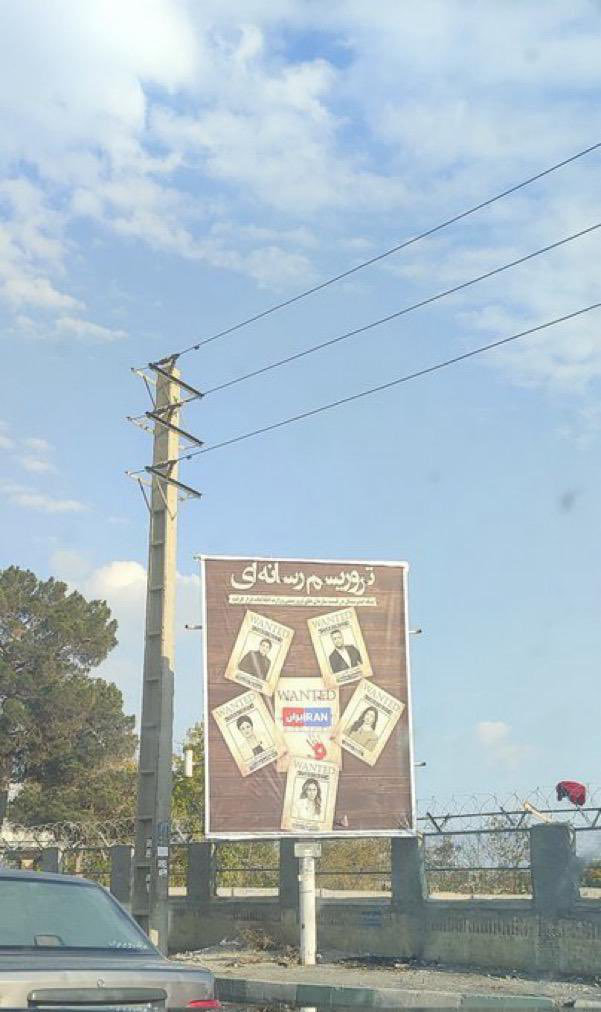
“Wanted dead or alive” posters against Pouria Zeraati, Sima Sabet, Niusha Saremi and Truske Sadeghi published by the IRGC-backed Fars News Agency seen on the streets of Tehran. (Supplied)
Two months earlier, Esmail Khatib, Iran’s intelligence minister, had said Iran International had been categorized by Tehran as a “terrorist” organization and that its “agents” would be pursued.
Sanctions were also announced against the channel and BBC News Persian, both accused of inciting riots and supporting terrorism with their coverage of protests in Iran, triggered by the death in custody of 22-year-old Mahsa Amini, who had been arrested in Tehran for violating Iran’s hijab laws.
On the same day that armed police locked down Chiswick Business Park, Ken McCallum, director-general of the UK’s domestic security service, MI5, said Iran “projects threat to the UK directly, through its aggressive intelligence services.
“At its sharpest this includes ambitions to kidnap or even kill British or UK-based individuals perceived as enemies of the regime.”

Iranian Revolutionary Guard commander Hossein Salami speaking during a military drill near the island of Abu Musa, off the coast of the southern Iranian city of Bandar Lengeh. (IRGC handout via Sepah News/AFP)
Only the previous week, he added, the British foreign secretary had “made clear to the Iranian regime that the UK will not tolerate intimidation or threats to life towards journalists, or any individual, living in the UK.”
But the news that one of Iran International’s London-based journalists had been attacked by a group of men and stabbed outside his home in Wimbledon, in south London, on March 29 showed that the regime remains undaunted in its determination to intimidate dissidents wherever they are in the world.
Pouria Zeraati survived the attack, which left him wounded in the leg — he later released a photograph of himself in hospital, smiling defiantly and vowing to be back on air soon. Back on the airwaves, he said “the show must go on.”

Pouria Zeraati, center, with leading British IRGC specialist Kasra Aarabi, left, and political commentator Al Hossein Ghazizade. (Supplied)
The attack is being investigated by the Metropolitan Police’s Counter Terrorism Command, which says his attackers drove straight to Heathrow Airport and fled the country. Their destination has not been revealed.
The “siege” of Chiswick Business Park, as it became known locally, continued until February 2023, when Iran International announced it was “reluctantly and temporarily” closing its London studios and moving to Washington, D.C.
The last straw for the company was the arrest on Feb. 11, 2023, of an Austrian national, who was caught red-handed by security staff while carrying out “hostile reconnaissance” outside its offices.
Magomed-Husejn Dovtaev was swiftly arrested by armed anti-terrorist police in a cafe at the business park.
He was charged with terrorism offenses and at his trial at the Old Bailey in December 2023 was found guilty of attempting to collect information “likely to be useful to a person committing or preparing an act of terrorism."

Magomed-Husejn Dovtaev, a Chechnya-born Austrian national, was convicted in Britain of spying for a group suspected of planning an attack on an independent Iranian TV station in London. He was sentenced to jail for three-and-a-half years. (Metropolitan Police photo / AFP)
During the trial it was revealed that the Chechen individual had taken a minicab directly to the business park after flying to Gatwick Airport from Vienna. He was sentenced to three years and six months in prison.
The reality, said an Iranian activist living in London speaking on condition of anonymity, “is that Iranian dissidents living in exile know they are increasingly at risk from a regime that has shown it can and will reach out to intimidate, threaten and even kill anyone, anywhere, any time.
“It is also clear that it has no qualms about using foreign and domestic criminals as its weapons of choice.”
The depths to which Iranian operatives are prepared to sink in order to silence critics became clear in January this year, when the US and the UK jointly imposed sanctions on a network of “individuals that targeted Iranian dissidents and opposition activists for assassination ... at the behest of Iran’s Ministry of Intelligence and Security (MOIS).”
According to the US Treasury, the network was led by “Iranian narcotics trafficker Naji Ibrahim Sharifi Zindashti and operates at the behest of Iran’s Ministry of Intelligence and Security.”
Zindashti’s gang was responsible for “numerous acts of transnational repression including assassinations and kidnappings across multiple jurisdictions in an attempt to silence the Iranian regime’s perceived critics.”
In a statement, the US Department of the Treasury’s Office of Foreign Assets Control said that the MOIS and Iran’s Islamic Revolutionary Guard Corps (IRGC) “have long targeted perceived regime opponents in acts of transnational repression outside of Iran, a practice that the regime has accelerated in recent years.
“A wide range of dissidents, journalists, activists and former Iranian officials have been targeted for assassination, kidnapping and hacking operations across numerous countries in the Middle East, Europe and North America.”
INNUMBERS
• 15 Plots to kidnap or kill UK-based individuals since start of 2022 by Iran’s secret army.
• 4 Iranians charged by US in 2021 for plot to kidnap journalist Masih Alinejad.
• $300,000 Money offered by accused Iranian in 2022 plot to murder ex-Trump official John Bolton.
The scale of the IRGC’s black-ops program in one country alone was hinted at in February last year when Assistant Commissioner Matt Jukes, the head of the Metropolitan Police’s counterterrorism unit, said that police and MI5 had foiled “15 plots since the start of 2022 to either kidnap or even kill British or UK-based individuals perceived as enemies of the regime.”
Only occasionally do such plots make the headlines.
The US believes that IRGC agents engineered the assassination in The Netherlands of Ahmad Molla Nissi, a 52-year-old activist who campaigned for independence for Iran’s Ahwazi Arabs. Nissi was shot dead outside his home in The Hague in November 2017.
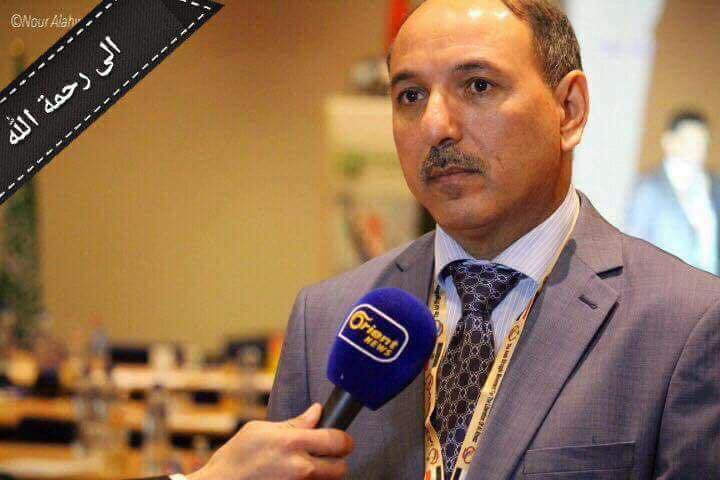
Ahmad Molla Nissi, founder of the Arab Struggle Movement for the Liberation of Ahwaz, was shot dead outside his home in The Netherlands in November 2017. (X: @ahwazona1999)
In October 2019 Ruhollah Zam, a journalist living under political asylum in France who ran a popular anti-government website, was kidnapped during a visit to Iraq. After being taken to Iran, he was tortured, subjected to a sham trial and then hanged on Dec. 12, 2020.
In July 2020 Jamshid Sharmahd, an Iranian German activist, was kidnapped while traveling abroad and forcibly brought to Iran, where he has been sentenced to death.
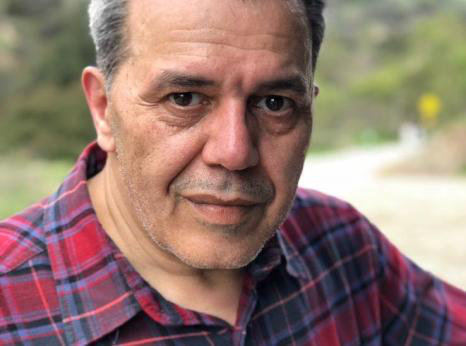
German-Iranian political dissident Jamshid Sharmahd. (Amnesty International photo)
According to US Treasury, Tehran “increasingly relies on organized criminal groups in furtherance of these plots in an attempt to obscure links to the Government of Iran and maintain plausible deniability.”
Zindashti, who was sanctioned by the US in January and is believed to be in Iran, is wanted by the FBI “for his alleged involvement in criminal activities including the attempted murder-for-hire of two residents of the state of Maryland.”
His Iran-based criminal network, says the FBI, “allegedly used encrypted, internet-based messaging applications to hire criminal elements within North America to murder two individuals who fled Iran” and “allegedly provided resources to facilitate the attempted transnational killing of a person within the United States.”
On Dec. 13 2023, a federal arrest warrant was issued for Zindashti after he was charged with “Conspiracy to use interstate commerce facilities in the commission of murder-for-hire” — US legal longhand for hiring a hitman.
According to the FBI, Zindashti was born in Urmia, a city in Iran’s northwest, close to the borders of Iraq and Turkiye. He weighs approximately 113 kg, is 190 cm tall and speaks several languages, including English, Farsi and Turkish.
The Iranians’ predilection for collaborating with underworld characters has led to some strange alliances. Alongside Zindashti, in January the US Justice Department indicted two Canadian nationals as alleged accomplices in his murder-for-hire plot to kill two US residents in Maryland.
Damion Patrick John Ryan, 43, and Adam Richard Pearson, 29, are members of a chapter of the motorcycle gang Hells Angels. Both are imprisoned in Canada on unrelated offenses.
The US Justice Department released details of the deal between Zindashti and the two men, who communicated through Sky ECC, an encrypted messaging network that has since been shut down by authorities in the US and Europe.
A fee of $350,000, plus $20,000 in expenses, was agreed for the killing of two targets, a man and a woman. Photographs of the intended victims were exchanged, along with their address and a map showing their location.
Discussing the plot regularly between December 2020 and January 2021, Ryan told Zindashti that having someone killed in the US was challenging, but that he “might have someone to do it.” That same day he messaged Pearson about a “job” in Maryland.
Pearson replied to say he was “on it” and that “shooting is probably easiest thing for them.” He would tell the gunmen he planned to recruit to “shoot (the victim) in the head a lot (to) make example,” adding “We gotta erase his head from his torso.” A “four-man team” would carry out the killings.
Immediately after the attack on Zeraati in London, a former journalist with Iran International said she had been told by the Metropolitan Police Counter-Terrorism Unit “to immediately leave my residence and stay elsewhere until further notice.”
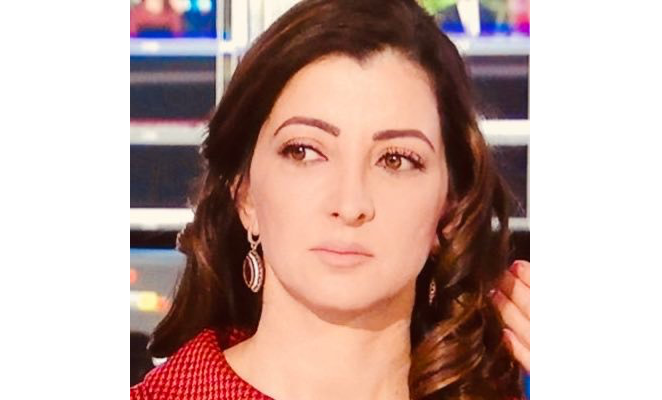
British Iranian journalist Sima Sabet. (X: @Sima_Sabet)
Writing on X, Sima Sabet revealed that last year she and her colleague Fardad Farahzad, who is now based in Washington, had been the targets of an assassination attempt orchestrated by the IRGC.
She said the plot was foiled by a “Western security service,” which had obtained “audio and video files in which a Quds Force commander ordered an individual to kill me and Farahzad with a knife.”
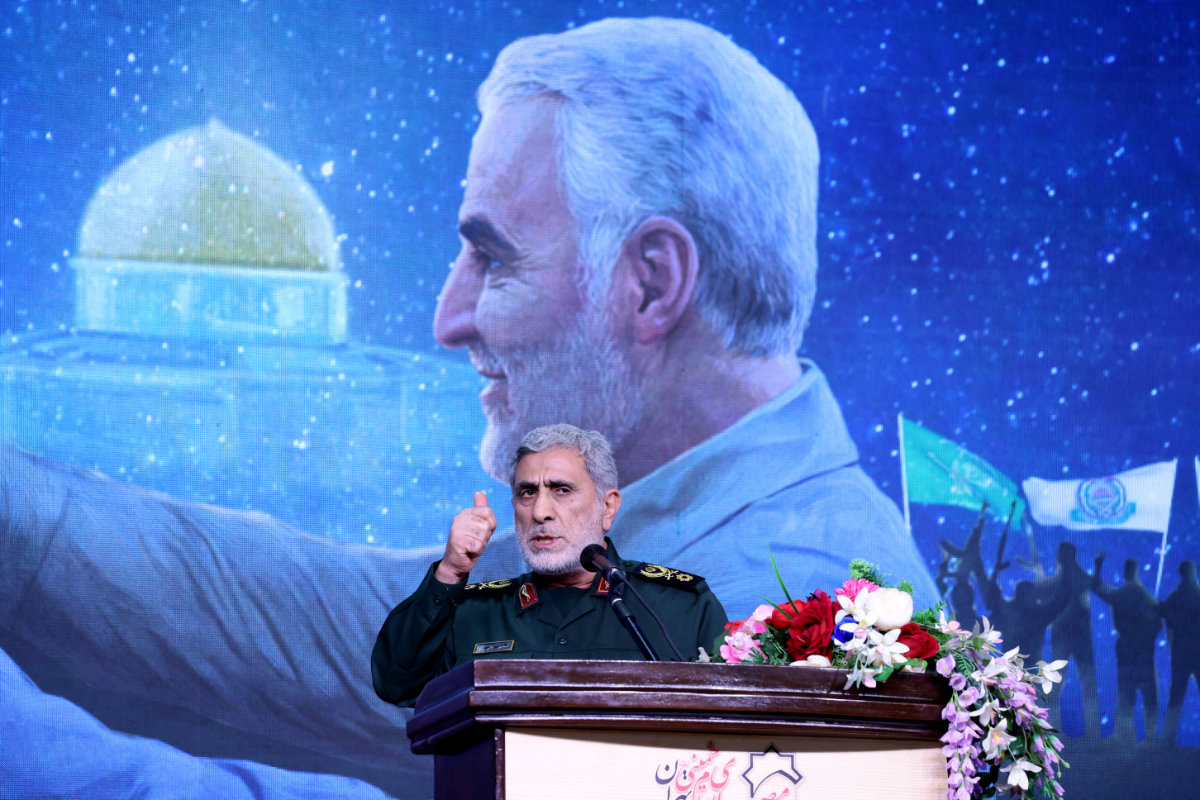
Esmail Qaani, commander of Iran's dreaded Quds Force, speaks in Tehran during a commemoration ceremony marking the anniversary of the 2020 killing of IRGCV general Qasem Soleimani (on screen) on January 3, 2024. (AFP/File)
According to Sabet, the attack on Zeraati was “a serious warning and an extremely troubling act for all journalists and opponents of the Islamic Republic in Britain and other Western countries.”
Mehdi Hosseini Matin, Iran’s charge d’affaires in the UK, has said “we deny any link” to the attack.






























